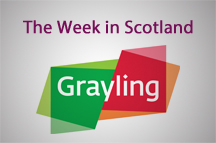It has been a long standing aspiration that a devolved parliament in Scotland should function similarly to other European Parliaments, with a more collaborative approach to legislation than what is witnessed in the combative atmosphere in Westminster. Any viewing of First Ministers Questions would most likely dissuade members of the public that this goal has been achieved.
 However, some weeks the Parliament does indeed rise to the expectations that were envisaged by the founders of devolution.
However, some weeks the Parliament does indeed rise to the expectations that were envisaged by the founders of devolution.
On Tuesday the Chamber, in a free vote, approved the final stage of the Marriage and Civil Partnership (Scotland) Bill. Scotland has now become the seventeenth country in the world to approve same-sex marriage. The timing of the Bill’s approval, days before the Winter Olympics in Russia, will not have gone unnoticed given the considerable controversy surrounding the host nation over the rights of the LBGT community.
The cross-party approach continued into Wednesday, with Finance Secretary John Swinney celebrating passing his seventh Bill through the Parliament. The package of measures includes £8 billion for infrastructure over the next two years, additional rates relief for small businesses and continuation of the council tax freeze.
In a break from tradition, Scottish Labour supported the Budget. This was due to Finance spokesperson, Iain Gray MSP securing support from the Government to bring forward additional funds to assist with mitigating the effects of the bedroom tax. While the detail of how exactly these funds can be allocated are still to be worked out, Labour MSPs endorsed the Budget. In past years, the SNP have been very effective in using Labour opposition to their Budgets to claim that they were against job creation and investment.
 By supporting the Budget, Scottish Labour have demonstrated a commitment to work with the Government to deliver key policy pledges, and shown how devolution can successfully function to deliver change. For the Scottish Government, John Swinney can claim to have delivered his most successful Budget since becoming Cabinet Secretary, and the SNP can sell the agreement as a taste of what politics in an independent Scotland could look like.
By supporting the Budget, Scottish Labour have demonstrated a commitment to work with the Government to deliver key policy pledges, and shown how devolution can successfully function to deliver change. For the Scottish Government, John Swinney can claim to have delivered his most successful Budget since becoming Cabinet Secretary, and the SNP can sell the agreement as a taste of what politics in an independent Scotland could look like.
Given this outbreak of positivity in the Chamber, one could have been forgiven for thinking that there would be a similarly productive approach to this week’s First Ministers Questions. However, it was not to be. Labour leader, Johann Lamont used the comments made by BP boss Bob Dudley this week to argue that big business was not convinced by the arguments for independence.
Mr Dudley professed his support for the Union, and his concern that Scottish independence could create uncertainty for his company. It is considered the most significant intervention so far in the debate from the private sector.
The First Minister argued that thousands of businesses in Scotland had already pledged their support for independence through the Business for Scotland group. He further pointed out that Dudley had also said the referendum wasn’t affecting future investments into Scotland. However, given the scale of BP, and its importance to the North East economy, it can be expected that his comments will be given a prominent position in future literature produced by Better Together.
 In polling news, Sir Tom Hunter, who has launched his own campaign to provide the Scottish public with more information about the referendum, released polling he had commissioned. It revealed that support for independence sits at 29%, with support for the Union at 42%, and 29% of voters still undecided.
In polling news, Sir Tom Hunter, who has launched his own campaign to provide the Scottish public with more information about the referendum, released polling he had commissioned. It revealed that support for independence sits at 29%, with support for the Union at 42%, and 29% of voters still undecided.
A second poll, published by YouGov, has placed Labour ahead of SNP in voting intentions in the Scottish Parliament. This will be a boost to the leadership of Lamont, who has also achieved two very strong by-election victories recently.
Parliament is now adjourning for a week long recess, with MSPs returning to the Chamber on Tuesday 18th February.
Robert Girvan
Account Executive, Grayling Public Affairs












